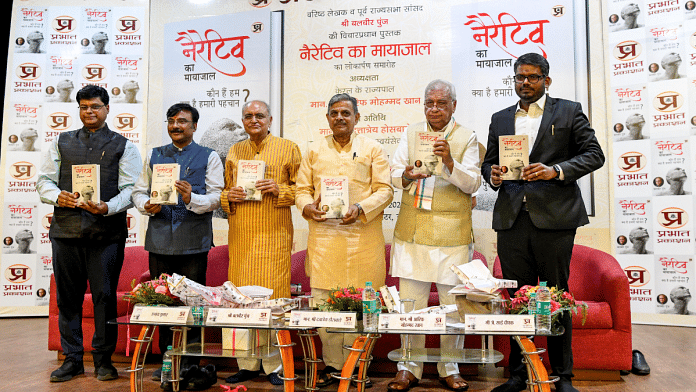New Delhi: In a world where “truths” that are convenient for some are often used to create a “narrative” that serves as propaganda, there’s a need for a strong thought movement that is based on India’s culture and history, Rashtriya Swayamsevak Sangh (RSS) general secretary Dattatreya Hosabale said Friday.
Hosabale was speaking at the launch of a book titled Narrative ka Mayajaal by former Bharatiya Janata Party (BJP) Rajya Sabha MP Balbir Punj. The function was held at NDMC Convention Centre in Delhi.
According to Hosabale, before the British came, Indians never underestimated themselves and fought against their enemies with courage and confidence. But the British created a narrative that made us doubt our own abilities, he said. “They made us hate ourselves; such a narrative was spread by their agents through academia, universities, think tanks, international media and judiciary,” he added.
At the event — attended by Kerala Governor Arif Mohammed Khan, former Union minister and MP Harsh Vardhan and MP Sonal Mansingh among others — Hosabale also said the journey of intellectual pursuit doesn’t end after discussing things from 5000 years ago.
“We need to move forward and create new knowledge. Narrative is a small aspect in the pursuit of truth, but it is important,” he said.
Asserting that we need to challenge the narratives that are imposed on us by others and present our own narratives that reflect our culture and history, the RSS general secretary said “truth should be seen in wholeness”.
Also speaking at the event, Kerala governor Khan said that one cannot understand politics without understanding culture. He went on to praise the RSS-supported Ekal Vidyalaya initiative — setting up one-teacher schools in remote areas.
Sharing an anecdote, he mentioned a visit to Nagpur University where he was told about the initiative, and about how some volunteers who were sent to the Northeast had to overcome their initial discomfort with the food habits of their hosts. This showed the vision and dedication of the workers, Khan said.
The governor added that today’s divided world needs a thought and ideology that sees everyone equally. He quoted verses from the Bhagavad Gita, Shrimad Bhagwat and Quran to highlight the greatness of Indian culture and civilisation.
Meanwhile, while introducing his book and speaking about the choice of an English word for the title of a book in Hindi, Punj said there is no word in Hindi that closely captures the essence of the word “narrative”.
“A narrative means an incident isn’t described as it happens, but it is presented in the form of a truth that suits one’s own personal agenda. It has no relation with the truth. In our country, a large number of problems are rooted in a polluted narrative, which was set by the Westerners,” Punj said.
Also Read: Delhi’s elite braved May heat to attend this grand book launch – with mandap, marigolds, music
‘Truth should be seen in wholeness’
According to Hosabale, a strong “thought movement” is needed to counter propagandistic narratives.
“In today’s world, all human-related institutions and systems — society, government, Constitution, education — need to be reconsidered from a fresh perspective. We need to think and promote a narrative rooted in our culture and history, but adapted to the present context,” he said.
Arguing that Indians have been tied up with eurocentric ideas — in our lives, our syllabus, our media, our discourse — a narrative is needed to free us from the colonised mind, he said.
“In our country, we had a tradition of shastrarth, which was a way of seeking truth. In shastrarth, I would present the truth that I know and have studied, and you would present the truth that you know and have studied. If your truth is higher than mine, I would accept it in shastrarth. It was not a matter of winning or losing; it was a matter of discovering the truth. This has been the tradition of narrative in our country,” Hosabale explained.
He also claimed that there was also a narrative against the Sanskrit language, portraying it as the “language of oppression and Brahmins” that should be “discarded”.
“Similarly, if you write your book in English, it will be sold in Delhi’s Khan Market. You will be called an intellectual, which is why writing in Hindi is important to challenge that narrative,” he added.
(Edited by Richa Mishra)
Also Read:



